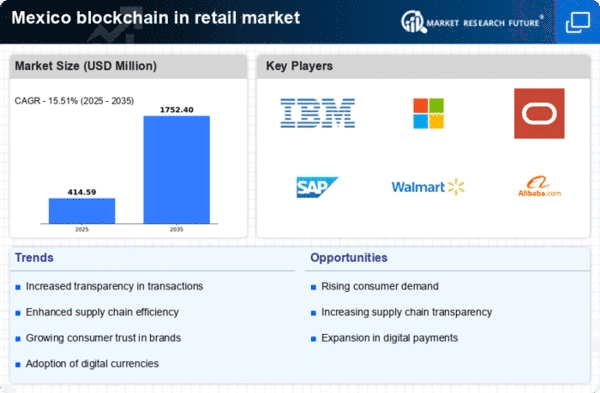Cost Reduction through Efficiency
Cost efficiency remains a pivotal driver in the blockchain in-retail market in Mexico. By streamlining operations and reducing intermediaries, blockchain technology can significantly lower transaction costs. Retailers that implement blockchain solutions may experience reductions in operational costs by up to 30%, as reported by industry analyses. This efficiency not only enhances profit margins. It also allows retailers to pass savings onto consumers, potentially increasing sales volume. As competition intensifies, the ability to offer lower prices while maintaining quality becomes a crucial differentiator, making blockchain adoption a strategic imperative for retailers.
Increased Demand for Traceability
The blockchain in retail market in Mexico is experiencing a surge in demand for traceability solutions. Consumers are increasingly concerned about the origins of their products, particularly in sectors such as food and pharmaceuticals. This heightened awareness drives retailers to adopt blockchain technology. It offers immutable records of product journeys from source to shelf. According to recent data, approximately 70% of Mexican consumers express a preference for brands that provide transparent sourcing information. This trend indicates a significant opportunity for retailers to leverage blockchain to enhance consumer trust and loyalty, thereby potentially increasing market share in a competitive landscape.
Regulatory Compliance and Standards
Regulatory compliance is a critical driver in the blockchain in-retail market in Mexico. As the government establishes clearer guidelines for blockchain usage, retailers are compelled to adopt these technologies to meet compliance requirements. This regulatory framework not only ensures consumer protection but also fosters a more stable market environment. Retailers that proactively align with these regulations may gain a competitive edge, as compliance can enhance brand reputation and consumer trust. Furthermore, the establishment of industry standards for blockchain applications could streamline operations and facilitate broader adoption across the retail sector.
Enhanced Security and Fraud Prevention
Security concerns are paramount in the blockchain in-retail market in Mexico, particularly regarding payment systems and consumer data protection. Blockchain technology offers robust security features that can mitigate risks associated with fraud and data breaches. By utilizing decentralized ledgers, retailers can ensure that transaction records are tamper-proof, thereby enhancing consumer confidence. Recent studies indicate that retailers adopting blockchain solutions have reported a 40% decrease in fraud incidents. This enhanced security not only protects businesses but also fosters a safer shopping environment for consumers, which is increasingly valued in today's digital economy.
Integration with Emerging Technologies
The blockchain in retail market in Mexico is poised for growth through the integration of emerging technologies such as artificial intelligence (AI) and the Internet of Things (IoT). These technologies complement blockchain by providing real-time data analytics and automation capabilities. For instance, AI can analyze consumer behavior patterns, while IoT devices can track inventory levels seamlessly. This synergy can lead to improved supply chain management and personalized shopping experiences. As retailers increasingly adopt these technologies, the blockchain in-retail market is likely to expand, offering innovative solutions that cater to evolving consumer demands.
















